This article was originally published on UrbanScrawl.
It was not their most popular skit featuring an impression of President Obama, but the fourth season of Key & Peele found Jordan Peele as our 41st Commander and Chief greeting a line of constituents. The joke starts small but is clear from the outset. President Obama greets the white supporters on the line very formally, almost to the point of being standoffish, while each successive greeting with a black person is more familiar and joyful. As the President Obama character reaches Keegan-Michael Key’s character he pauses, unsure how to greet him; just then a secret service member leans in to whisper, “octoroon.” President Obama’s response is a confident, “afternoon, my octoroon” to Key, with a handshake that turns in to an awkward hug. The subtext of this particular charade connects to Branden Jacobs-Jenkins An Octoroon, currently playing at Woolly Mammoth Theatre Company, as both are built on a truism that even predates the formal founding of this nation: genetic connection supersedes social connection.
An Octoroon is defined as someone who is one eighth black by descent, a child of a person of white ancestry and a person who is one quarter black by descent. The play An Octoroon, which has a running time of two hour and 40 minutes with a 15-minute intermission, is an adaptation and updating of Dion Boucicault’s 1859 play The Octoroon. Under the direction of Nataki Garrett, Jacobs-Jenkins’ remains set on a Louisiana plantation. The action is set in motion by the unexpected death of the plantation owner which leaves the estate in disarray. Immediately as the action starts the adaptation also takes hold, leaving Boucicault’s universe well behind.
Born in Ireland in 1820 Boucicault moved to New York City in 1853. His The Octoroon premiered in New York six years later, two years before the start of the U.S. Civil War. Much has changed in race relations since 1859, but as the Key and Peele skit highlights, The Octoroon’s central concern of identity updates easily.
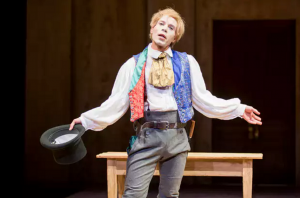
Jon Hudson Odom in An Octoroon at Woolly Mammoth Theater
This cast is led by Jon Hudson Odom who plays all three lead characters: the villainous M’Closky, the play’s flawed hero George, and the defector narrator/author. An Octoroon begins with Odom emerging from the shadows, from behind a dark curtain, wearing only a pair of dark briefs. He peers into the audience and begins telling us about the pains and trials of being a modern-day black playwright. The dialogue—masked as a conversation—plays on the ideas of intention, duty, and truth, and by the end of the first speech we know Odom will be playing a bigoted white character in the antebellum South and simultaneously know that not every word from this black playwright is an edict on race.
This adaptation forces the three lead characters to wrestle with each other’s identity. What is it to be a modern black playwright? What is it to be a slave owner? What is it to be a free black man in the time of slavery?
An Octoroon is plagued by an issue that confounds many stories about the mid-Atlantic slave trade: how deeply can one delve into the brutal history within a narrative that enlightens and informs? How do you avoid the easy traps of sympathizing with people that committed horrible, yet common acts? How do you show the right tone of resentment among the enslaved without making them stereotypically angry?
Where An Octoroon genuinely soars is in the portrayal of identity of the last house slaves on the planation, Minnie (played by Shannon Dorsey) and Dido (played by Erika Rose.) Dido and Minnie’s senses of self draw the clearest lines in the production, reflecting on why the forced-upon identity-rendering of any individual slave or playwright is a profound indignity. The two women laugh not because they are aloof or seeking a different situation but because they are aware of the danger in the midst of which they persevere. Their sense of self shames the apparatus of slavery.
Jacobs-Jenkins’ An Octoroon succeeds in many ways, but fails in two.
The choice to have Odom play both the villain (M’Closky) and the hero (George) is a little too clever. Odom is an exceptional performer but in the scenes where he is playing both the inquisitor and the denier the play’s creative juices overwhelm the text.
The title character, played stirringly by Kathryn Tkel, undergoes a massive shift in status, but doesn’t seem to be transformed by it. The character’s inability to confront those that have wronged her leaves her in an unsatisfying purgatory.
Still, Jacobs-Jenkins saves for her some of the best lines of the play. In a moment when Zoe is struggling with a loss outside her control she utters, with so much compassion, “I rather be black than ungrateful,” crystallizing one of the undersold ravages of slavery: the loss of identity outside of the machinery of servitude.
An Octoroon will run at Woolly Mammoth Theater through June 26; tickets are available through the Woolly site here.

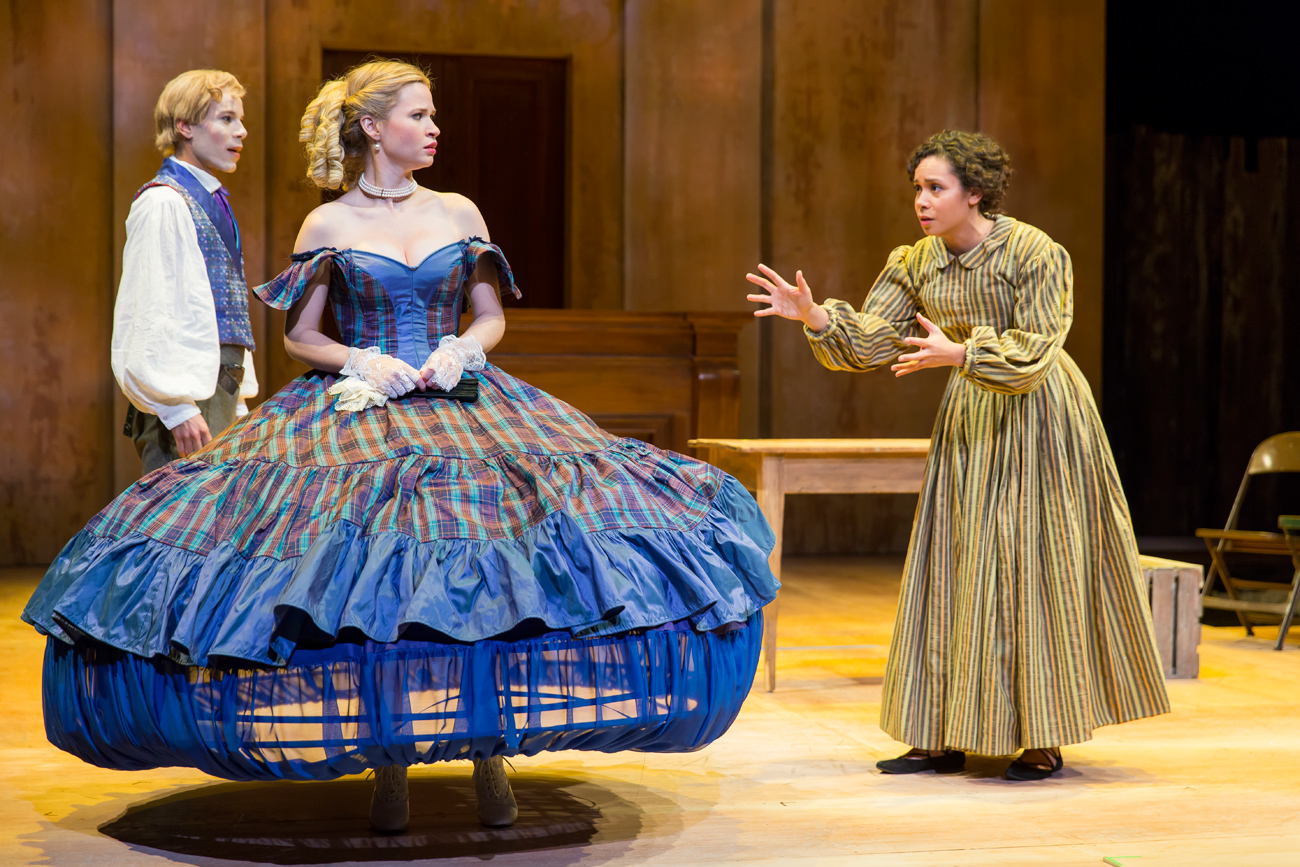
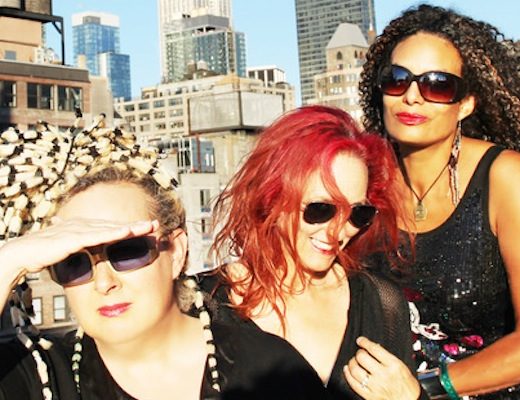
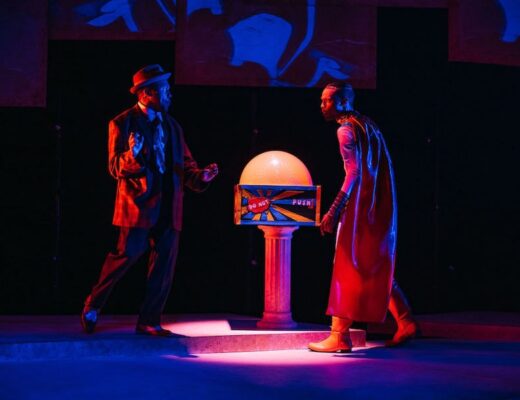
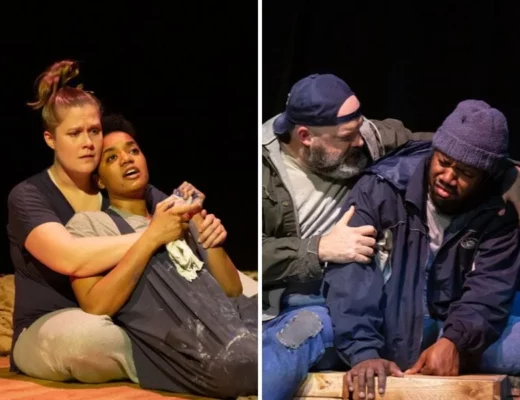
1 Comment
Highlights - July 8, 2016 - Artapedia
July 8, 2016 at 12:04 pm[…] An Octoroon by Branden Jacobs-Jenkins at Woolly Mammoth Theater Company “What is it to be a modern black playwright? What is it to be a slave owner? What is it to be a free black man in the time of slavery?” […]